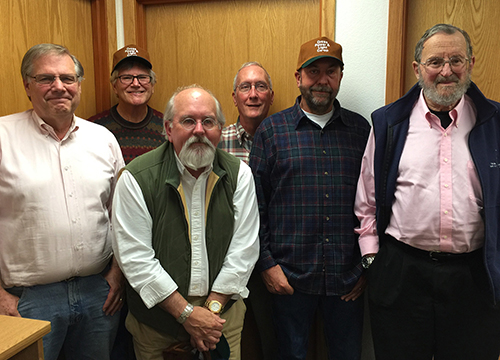— from Suzanne Olson for OPALCO, updated Sept. 30 at 3 p.m. —
 At the September 16 meeting of the OPALCO Board of Directors in Friday Harbor, a volunteer Member Review Committee on Elections presented seven categories of recommendations for changes to OPALCO’s election process. Co-op members will have an opportunity to review and comment on the proposed changes at a series of open house events scheduled October 6-11. The Board expects to make decisions at the October 20th board meeting with member feedback gathered at the open house events.
At the September 16 meeting of the OPALCO Board of Directors in Friday Harbor, a volunteer Member Review Committee on Elections presented seven categories of recommendations for changes to OPALCO’s election process. Co-op members will have an opportunity to review and comment on the proposed changes at a series of open house events scheduled October 6-11. The Board expects to make decisions at the October 20th board meeting with member feedback gathered at the open house events.
Board President Vince Dauciunas extended “gratitude and admiration to the Committee for their significant work” and stated that their recommendations would be given serious consideration. Dauciunas proposed a special meeting of the Board to discuss the timeline and practicalities for implementation, in order to enact changes for the 2017 election cycle. The special meeting is scheduled for Thursday, September 29th at 8:30 a.m. in the Eastsound OPALCO office and is open to Co-op Members.
The seven-member Committee representing all four voting districts met for six weeks to conduct this comprehensive review under the mission statement they wrote: To support a transparent election process that enables members to feel fairly and well represented. The Committee members are: Terry O’Sullivan, Co-Chair (Orcas), Wally Gudgell, Co-Chair (Orcas), Ed Sutton (Orcas), Doug Marshall (Orcas), Gabriel Jacobs (Shaw), Rob Thesman (Lopez) and Stephen Shubert (San Juan).
Following six weeks of meetings, healthy debate, comprehensive research and some input from members in each of their districts, the Committee reached consensus on the following categories of recommendations:
- Encourage more member interest in the cooperative and its election process. Several specific suggestions are offered, including formal district meetings.
- Elect five of the director positions by district and two at large, in order to encourage greater interest and promote member communications. Replace the present four districts with the same three districts used in County Council elections, and stagger the terms from each district (rather than electing all directors from each district during the same year), so that almost all members vote each year on at least one director position. Recommended transition steps are suggested.
- Create a standing Nominating Committee composed of 3 members from each from the three proposed voting districts, each with rotating 3 year terms. Recruit and nominate the best Board candidates, regardless of incumbency.
- Adjust the elections timeline to provide more time for nominating directors by petition (and update the required number of petition signers from 15 to 20); close voting earlier and allow only absentee ballots to create more time at the annual meeting for substantive discussion and activities.
- Obtain member feedback over the next year regarding the concept of having up to two additional director positions, to be elected by the sitting Board. The goal is to select individuals whose backgrounds would help the Board address our cooperative’s specific challenges.
- Review director compensation, and publicize the benefits of board service during the nominating process.
- Adopt a series of clarifying “housekeeping” changes to the provisions of the Bylaws that relate to elections.
The full Committee report is available online: www.opalco.com/wp-content/uploads/2016/09/2016-MRC-on-Elections-Report.pdf.
The Open House schedule is as follows:
- Oct 6
Open House – Lopez
Lopez Island, Woodmen Hall | 5:00 pm - Oct 7
Open House – Friday Harbor
San Juan Island Grange | 3:00 pm - Oct 10
Open House – Shaw
Shaw Island Community Building | 2:00 pm - Oct 11
Open House – Eastsound
Orcas Island Senior Center | 5:00 pm
Community Event
The October Board of Directors Meeting will be held Oct. 20 at the Eastsound Conference Room at 8 a.m.
Orcas Power & Light Cooperative (OPALCO) is our member-owned cooperative electric utility, serving more than 11,000 members on 20 islands in San Juan County. OPALCO provides electricity that is 95% greenhouse-gas free and is generated predominantly by hydroelectric plants. OPALCO was founded in 1937.
**If you are reading theOrcasonian for free, thank your fellow islanders. If you would like to support theOrcasonian CLICK HERE to set your modestly-priced, voluntary subscription. Otherwise, no worries; we’re happy to share with you.**










As I mentioned at yesterday’s special OPALCO Board meeting, measure #2, if adopted, would take a major step in better aligning the representation of the Board members with the number of OPALCO members across the various islands. The elections of Board members should still be done across all three districts, as we now do for members of the County Council. In fact, Executive Director Foster Hildreth showed a survey at the meeting of about a dozen rural electric coops, in which almost all of them voted that way. Only one of them voted district by district for their Board representatives.
Because it would represent a MAJOR CHANGE in the way OPALCO does business and elects Board members, any such decision should be submitted to a vote by ALL OPALCO members and not made by the Board itself. That would help avoid the kind of controversy and second-guessing that have occurred in response to the Board decision expand into telecommunications by purchasing Rock Island.
On recommendation #2, I agree with Michael that this is a major change that should be submitted to a vote by all members if it is deemed worthy of serious consideration. I personally feel that this proposed change is a bad idea for two main reasons:
1. “Elect by district” votes are unequal and unfair. When each member votes for all directors, not just a portion of the board, each voting member, regardless of where s/he resides, has equal influence over the outcome of each election. This system preserves the one-member-one-vote rule.
In contrast, “election by district” would have two San Juan positions elected by 5000 members, two Orcas positions elected by 3700, and one Lopez/Shaw position elected by 2500. This means that a vote from San Juan, Lopez and Shaw counts as only 74% of an Orcas vote.
2. The board’s accountability to membership gets muddied when most directors are accountable only to their own little district. Most OPALCO decisions affect members on all islands, but with the proposed changes, the directors steering OPALCO would have divergent accountability. This seems like a recipe for divisiveness and confusion at a time when OPALCO needs solidification of members’ support the most.
The Committee appreciates your feedback and the suggestions about ways to gain consensus. Let’s continue the discussion at the the Opalco Open House on Tuesday, Oct. 11th, 5:00 pm at the Senior Center.
Here is some pertinent information. Election by district is commonly used by cooperatives. It is typically used in situations like ours, where the membership spans distinct communities of interest or where it is difficult to travel to a central meeting. Typically, then, district meetings are held in each district.
The National Rural Electric Cooperative Ass’n surveyed members about election practices. Of the coops that responded, about one fourth vote by district.
For readers’ information: The Election Review Committee’s rationale for recommending election by district was as follows:
— Voter turnout last spring was only about 15% of the membership. The committee recommended several strategies that might help improve that participation.
— Today, all 11,000 Opalco members vote to decide who will represent each director district. Data suggests that in the past, Opalco members have been more likely to return ballots when the director elections involve their district, and participate less when their district does not have a director election.
— This may reflect a phenomenon that I suspect we are all familiar with, of being reluctant to vote in an election if we don’t know enough about the candidates running to make an informed choice. Right along with that is the problem of whether uninformed voting elects the best candidates.
— It is likely that the major Islands have enough community interaction that candidates from a major Island are likely to be fairly well known by a lot of Opalco’s members on that Island. But there is little such interaction between the major Islands, and little familiarity with candidates from the other Islands.
— So it is reasonable to hope voting by districts will make people more comfortable choosing, encourage higher turnout, and result in more informed candidate selection.
Yes, we did discuss the fact that the County moved away from that approach in Council elections. Several of us remain uncomfortable having to vote for the council candidates from other islands. I ask you, the reader, whether you really feel you have an informed opinion about whether the directors from Lopez and San Juan are good for us, or whether you can even name them. But I digress — the topic is Opalco elections, not Council elections.
So let’s talk on October 11th about which approach will work best for Opalco!
Having read the above two comments, I have to agree with Chom. We should vote across all the districts for all the Board members, including those coming from specific districts and the at-large Board members. This preserves the democratic one member, one vote standard. Doug’s comment notes that three-fourths of the RECs vote this way, and Foster Hildreth’s informal survey found that nine-tenths of his sample vote this way.
I’ll be there on October 11 to press this point, and I suspect that Chom will be present on Lopez October 6.
Elections Review Committee recommendations WILL help ALL OPALCO MEMBERS
Though a co-chair of the Committee, I feel the necessity to respond as an individual OPALCO member to opposing commentary which is full of twisted logic and false assumptions.
As evidenced by this commentary, once again there is a very vocal minority who are trying to influence what the majority of OPALCO members think by flooding our local media with an inaccurate interpretation of a series of recommendations that are designed to improve election transparency and allow members to feel fairly and well-represented. This minority do not offer any constructive alternatives, but just loudly voice a biased opposition to everything proposed by anyone else.
I urge all open-minded OPALCO members to attend at least one the next three meetings to be held on San Juan, Shaw and Orcas on Friday, Monday and Tuesday.
Please read the recommendations yourselves, ask questions and listen to the answers, engage in civil discussion, form your own educated opinion and propose intelligent constructive alternatives if you feel they are warranted.
Do not let someone else form your opinion for you.
This is how improvements to any process are made.
Terry O’Sullivan’s comment that “a very vocal minority” is opposed to the OPALCO elections changes suggested by his review committee has absolutely no basis in evidence and is therefore without merit.
At the Orcas Island members’ open house on Tuesday evening, large majorities of those present opposed the proposed district-only voting of measure #2 and the suggestion of non-member Board members of measure #5. Former OPALCO director and current Board member Randy Cornelius came out strongly against the former, and Rick Hughes vocally opposed the latter. The straw vote against measure #5 was virtually unanimous.
I hear that similar reactions to these measures occurred on Lopez Island the previous week. Taken together, these meetings give good evidence that the OPALCO membership is largely opposed to these two proposed measures. Other proposals, like establishing a standing Nominating Committee, make good sense and received largely favorable votes.
In the future, I would urge Mr. O’Sullivan to obtain concrete evidence for his personal opinions before stating them as if they were facts, or to state them as his opinions.
As further evidence against Sullivan’s “very vocal minority” comment — OPALCO asked for a show of hands during the well-attended Lopez Island open house. It was, as near as I could tell, a consensus vote in opposition to recommendations #2 and #5. No one raised a hand in support of either. I didn’t do a head count of OPALCO members present, but I’d guess it was around 100. The recommendation to appoint a standing committee to nominate OPALCO board members received cautious approval based on a good-faith understanding that OPALCO would do what it could to ensure that the nomination committee is representative of the diversity of the OPALCO membership.
I don’t want to pretend to speak for OPALCO management or the board, but my understanding of the purpose of the recent community meetings was to solicit feedback on the election committee’s various proposals. At the two meetings I was at, I think Foster described the showing of hands as a “straw poll” to “get the sense of the attendees”.
As an OPALCO member and a member of the elections committee, I think that management and the board needed to hear the views of everyone who took the time to attend the meetings. But to criticize Terry’s comment by assuming that the opinions expressed by the attendees is somehow a statistically representative sample of all OPALCO members is to make the same error you’re ascribing to Terry – while the feedback from everyone is valuable, you need to remember that attendance at the meetings was a self-selected group – there’s no statistical basis to make the claim that it’s representative of all members.
In an e-mail to the board on 9/23, one self-described leader “on the subject of unleashing the power of community” threatened to “organize members to come out and dominate these upcoming meetings with this issue”. I’m not suggesting that’s what happened, or that everyone who attended the meetings was affiliated with that group, but the threat was made. The board needs to take that into consideration when evaluating the feedback from the meetings – the raising of hands at the meetings was representative of those who chose to attend. There is no basis to extrapolate that to being some kind of proxy for the entire membership. It may be representative of the entire membership, or it may not be – no one knows.
I’m not criticizing anyone’s viewpoint. As a member of the elections committee, I appreciate very much that everyone who attended took the time to come to the meetings to learn about the proposals – I’m simply saying that it doesn’t help to criticize one person’s supposed logic error by making another logic error.
At the Orcas meeting, Brian Silverstein explained the possible courses of action available to the board. They could choose to do nothing. They could choose to adopt any or all of the recommendations by a vote of the board. They could choose to change or modify any or all of the recommendations. They could put any or all of the recommendations up to a vote of the membership.
To attempt to shut down further discussion and deliberations by inferring that there has been some dispositive opposition to the recommendations demonstrated by the entire co-op membership is incorrect and undemocratic.
Terry’s comment continues to have no basis in evidence. He should have stated it as his opinion, not presented it as a fact.